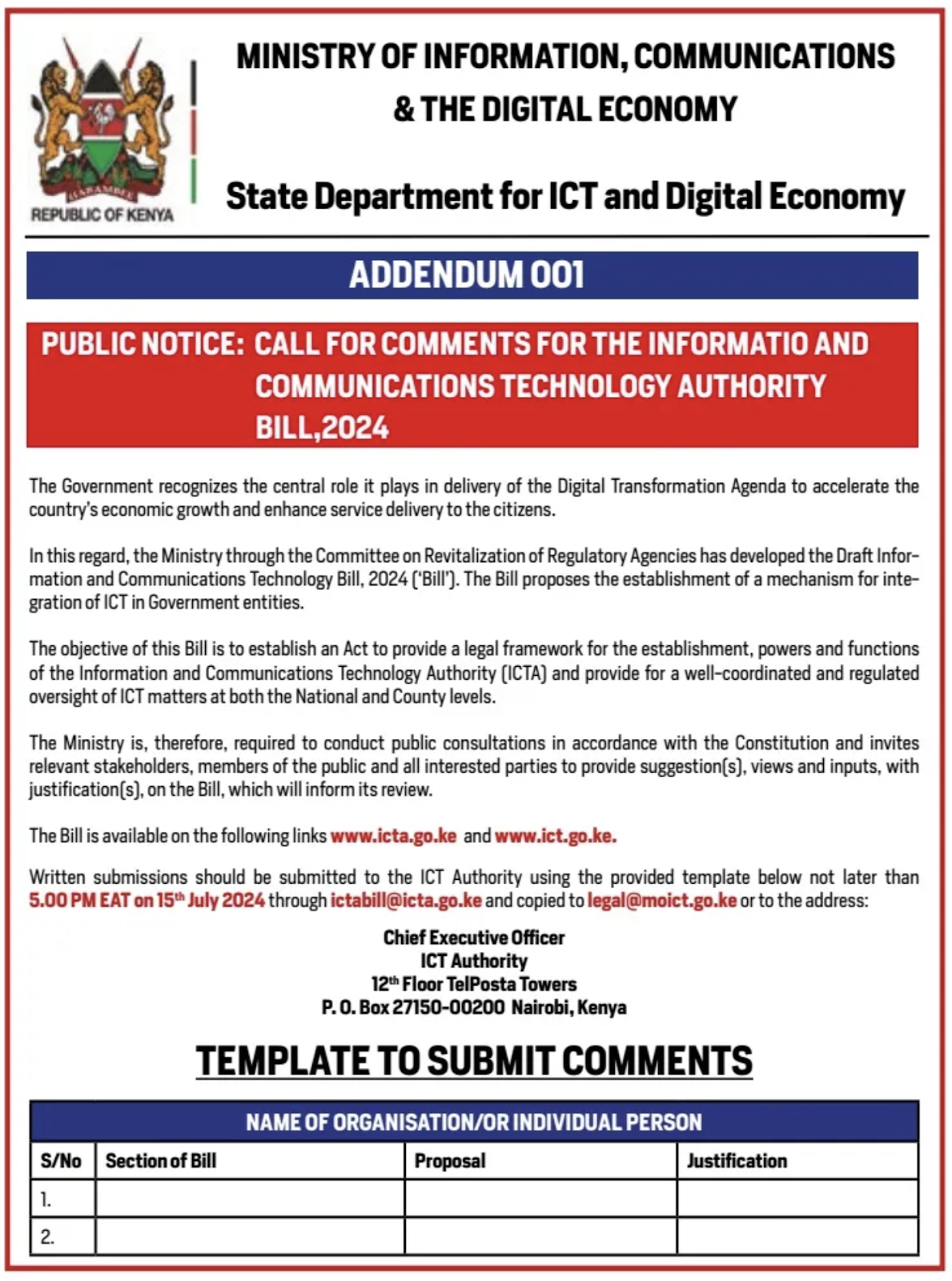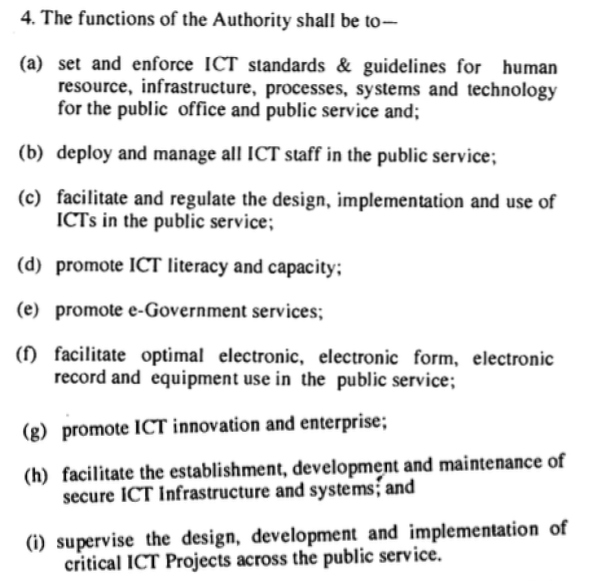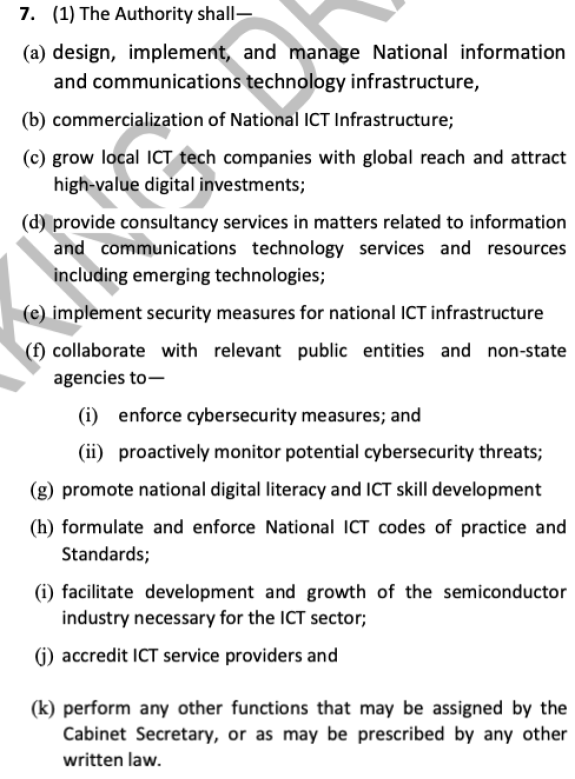Comparative Analysis of the Draft Information And Communications Technology Authority Bill, 2024

Public Notice Call for Comments for ICTA Bill, 2024. MyGov.go.ke
On 9th July 2024, the Kenya ICT Authority published an updated working draft Information And Communications Technology Authority Bill, 2024. This article hopes to reflect on three things;
- A comparison between this draft and the April 2024 draft.
- A comparison between the published draft and the current 2013 Presidential Order that constituted the ICT Authority.
- Reflections on “accreditation” proposed in the draft bill.
Comparison between June 2024 and April 2024
In April 2024, ICTA Published an initial draft of this same document and made it available for comment. They engaged a few stakeholders that then resulted in this June working draft. So what has changed since then?
1. Expansion of the Authority's Scope and Functions:
The June 2024 draft expands the Authority's functions in Clause 7 (previously Clause 6 in the April 2024 draft):
Added in June 2024 draft: “(b) grow local ICT tech companies with global reach and attract high-value digital investments;”
Modified in June 2024 draft: ”(c) provide consultancy services in matters related to information and communications technology services and resources including emerging technologies;” vs “(d) provide consultancy services in matters relating to ICT services and resources;”
Modified in June 2024 draft: “(g) promote national digital literacy and ICT skill development;” vs “(g) promote digital literacy and ICT skill development;”
Added in June 2024 draft: “(i) facilitate development and growth of the semiconductor industry necessary for the ICT sector;"
2. Headquarters Specification:
The June 2024 draft adds a new Clause 6 specifying the Authority's headquarters:
"6. (1) The headquarters of the Authority shall be in Capital City."
3. Qualification Requirements for Chief Executive Officer:
In April 2024 draft, Clause 14(2)(a): "holds a postgraduate degree from a university recognized in Kenya in engineering and information communications technology;"
In June 2024 draft, Clause 15(2)(a): "holds a masters degree from a recognized university in engineering and information and communications technology field"
4. ICT Infrastructure Allowance:
The June 2024 draft expands on the requirements in Clause 24 (previously Clause 18 in the April 2024 draft):
Added in the June 2024 draft: "(c) (collaborations with NCA)"
5. Accreditation of Service Providers:
The June 2024 draft modifies the language in Clause 27 (previously Clause 21 in Document 2):
April 2024 Draft: "A person who intends to provide ICT services shall apply to the Authority for accreditation"
June 2024 Draft: "A person who intends to provide ICT services to any entity shall apply to the Authority for accreditation"
Comparison between June 2024 Bill and Current 2013 Legal Notice / Presidential Order
The ICT Authority currently works as a function of the 2013 Legal Notice / Presidential Order. Here are the key changes and their implications from the 2024 Bill:
1. Legal Status:
2013: Established by Presidential Order under the State Corporations Act.
2024: Proposed to be established by an Act of Parliament.
Implication: This change elevates the Authority's legal standing, potentially giving it more autonomy and stability.
2. Scope and Functions:
2013 (Clause 4): "(a) set and enforce ICT standards & guidelines for human resource, infrastructure, processes, systems and technology for the public office and public service…"
2024 (Clause 7): "(a) design, implement, and manage National information and communications technology infrastructure, (b) commercialization of National ICT Infrastructure; (c) grow local ICT tech companies with global reach and attract high-value digital investments;..."
| 2013 | 2024 |
|---|---|
 |  |
Implication: The Authority's role would be significantly expanded from primarily focussing on improving ICT in the government to actively managing infrastructure and promoting economic growth in the whole ICT sector.
3. Board Composition:
2013 (Clause 6): "(e) not more than six persons, not being public officers, appointed by the Cabinet Secretary"
2024 (Clause 8): "(e) five other persons, not being public officers, appointed by the Cabinet Secretary;"
Implication: Slight reduction in the maximum number of appointed board members, potentially for a more simplified decision-making process (avoiding deadlocks).
4. Chief Executive Officer:
2013 (Clause 11): "(2) The Cabinet Secretary shall appoint the first Chief Executive Officer of the Authority upon commencement of this Order for a term of not more than three years but subsequent appointments shall be made by the Cabinet Secretary on the recommendation of the Board after a competitive recruitment process on such terms and conditions as shall be determined."
2024 (Clause 15): "(1) The Board shall, through an open and competitive process, appoint a suitably qualified person to be the Chief Executive Officer of the Authority."
Implication: The appointment process will solely remain with the board and removed from Cabinet Secretary approval.
5. Qualifications for Chief Executive Officer:
2013 (Clause 11): "a degree from a recognized institution and has a least seven years working experience in a senior position"
2024 (Clause 15): "holds a masters degree from a recognized university in engineering and information and communications technology field" and "has at least fifteen years working experience, five of which must be at a senior managerial level"
Implication: The qualifications have become more stringent and specific to ICT, likely to ensure more specialised leadership.
6. New Provisions in 2024 Bill:
a. ICT Codes and Compliance (Clauses 25-26): The 2024 bill introduces the concept of ICT codes and mechanisms to ensure compliance, which were not present in the 2013 order.
b. Accreditation of Service Providers (Clauses 27-30): The 2024 bill introduces a system for accrediting ICT service providers, including procedures for suspension and revocation of accreditation.
c. Provision for ICT Infrastructure Allowance (Clause 24): This new clause requires consideration of ICT infrastructure in construction projects.
On ICT Professionals / Practitioners Accreditation
An addition to the 2024 bill is “accreditation of service providers” and it would be useful to expound on this more.

The definition of “accreditation” is missing from section 2 of the bill so we can assume it is the literal term to mean;
accreditation
/əˌkrɛdɪˈteɪʃn/
noun
noun: accreditation; plural noun: accreditations
-
the action or process of officially recognizing someone as having a particular status or being qualified to perform a particular activity.
"the accreditation of professionals"- official certification that a school or course has met standards set by
external regulators.
"the first fully online university to receive national accreditation"
- official certification that a school or course has met standards set by
external regulators.
-
an acknowledgement of a person's responsibility for or achievement of something.
"both parties create authorship, and to make this clear I have always used joint accreditations"
In Kenya, the Kenya Accreditation Service Act 2019 established the Kenya Accreditation Service (KENAS) to recognize the Service as the sole national accreditation body. The act defines accreditation this way:
"accreditation" means, in relation to a Conformity Assessment Body, an attestation by the Service that the conformity assessment body is competent to carry out specific conformity assessment tasks;
Whether ICTA would need to work with KENAS to include ISO / KEBS Standards in their (KENAS) accreditation options or it will be a parallel endeavour is still not clear. So far ICTA has had its own accreditation portal for ICT Suppliers which all indications point to it continuing to be the main channel of engagement. Some also argue that accreditation is only for “legal persons” i.e. companies or organisations but we can reserve that for another day.
What comparisons can we draw from other regulatory bodies? e.g., legal and medical practitioners in Kenya
First, I would like to give flowers to the lawyers at Law Society of Kenya (LSK) and particularly President Faith Odhiambo for supporting protestors and upholding the Constitution of Kenya during the recent protests against the Finance Bill. Words can never be enough.
The LSK and the Kenya Medical Practitioners and Dentists Council (KMPDC) are both professional regulatory bodies in Kenya, albeit for different fields. Despite their distinct areas of focus, they share several common characteristics. Here are the key traits they have in common:
- Governance Structure: Both the Law Society of Kenya (LSK) and the Kenya Medical Practitioners and Dentists Council (KMPDC) have elected councils or boards responsible for policy decisions and organisational oversight, ensuring leadership accountability and member representation.
- Transparency and Accountability: They operate with transparency and accountability through regular reporting on activities, financial management, and decisions, maintaining trust within their professions and with the public.
- Advocacy and Representation: LSK and KMPDC advocate for their members' interests in discussions with the government and other stakeholders, promoting policies and regulations that benefit their professions and protect public interest.
Most important is that the legitimacy of these bodies come from their communities. Similar to “No taxation without representation” movements since the beginning of civilization, only institutions that have upheld this dictum have thrived.
International Examples
It was difficult to find any other bodies who have accreditation and/or registration of ICT professional save for two - Oman and Tanzania; The Ministry of Transport, Communications and Information Technology (MTCIT) in Oman maintains a register of accredited IT Service Providers that have complied with the ministry's requirements. In Tanzania, they have a similar portal to that of ICTA however it looks voluntary, and having hired in Tanzania, it has never come across as a point.
At most what can be found in the form of “accreditation” for ICT practitioners was security clearances which tend to cut across all professions.
Final Thoughts on Accreditation
Additional questions remain on accreditation in the ICT Authority Bill 2024; should an implementing body also be a regulator? Can a body accredit/regulate itself? Without an expert head, is it possible to accredit those who have more experience / qualifications than you? What role do universities play in this?
Conclusion
Konza Technopolis was in a similar boat having been set up as a Presidential Order under President Mwai Kibaki in 2012, and had a bill in 2023 introduced to Parliament by Sen. Gloria Orwoba but was “negatived” at the second reading stage. The same bill (“same” pending a similar comparative analysis) has been reintroduced by Hon. Kimani Ichung'wah this year.
With the ongoing rationalisation of state corporations, we are not sure if these beacons of Kenya’s ICT sector, Konza and ICTA, will be included and absorbed into the Ministry of ICT (or the rumoured “Ministry of Trade, Investments and Industry, SMEs, Cooperatives, Delivery Unit and ICT”).
Nonetheless, if you are Kenyan, it is important to get involved. There is an X-space that will be hosted with PS Tanui, ICTA CEO Stanley Kamanguya, Nanjira Sambuli, and other notable tech sector players on Friday 12th July 2024 at 7pm. I would encourage you to join. - https://x.com/0xNdeto/status/1810944434885845123
Additional Links
- Email Template to submit comments - https://docs.google.com/document/d/e/2PACX-1vSl7n1Fp934pS1EpMBQkETb3HiBFpLg2Lyaja6z8PEsviVin0qgxM8lT47KXYowqYpFeEHfXo6N6EMH/pub
- ChatGPT (1) - https://chatgpt.com/g/g-onRXZwI9D-ict-authority-bill-2024-gpt
- ChatGPT (2) - https://chatgpt.com/g/g-eLeBzwkRa-proposed-ict-bill-paralegal
